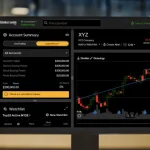For many traders, the biggest obstacle isn’t a lack of skill or knowledge—it’s insufficient capital. This is where funded trading accounts come in, offering a game-changing opportunity to access significant capital without putting your own money at risk. Proprietary trading firms, or prop firms, supply the funds, and in return, traders share a portion of their profits.
This business model has gained huge popularity, especially with experienced traders seeking flexibility, low commissions, and generous drawdown limits. With thousands now participating in these programs each month, it’s clear that funded trading has transformed the trading landscape.
What Exactly Is a Funded Trading Account?
A funded trading account allows a trader to use a firm’s capital to trade in financial markets. Rather than risking personal savings, the trader operates with the firm’s money under predefined risk parameters.
These accounts grew in popularity as trading technology advanced and access to global markets became more widespread. To qualify, traders must pass an evaluation phase where their performance, consistency, and risk management are assessed. Successful candidates gain access to live accounts with firm capital.
This setup is particularly attractive for traders with solid strategies but limited funds. Firms are able to identify disciplined individuals while filtering out overly risky behaviour.
Funded vs. Regular Trading Accounts
The key difference is ownership and risk. In a regular trading account, you invest your own money and carry the full risk of any losses. With a funded account, you trade using the firm’s money, with the firm absorbing potential losses—within set drawdown limits.
However, there are trade-offs. Funded accounts often come with strict rules regarding position sizes, trading hours, and strategies. Certain tactics, such as scalping or trading on major news releases, might be restricted.
Steps to Getting a Funded Account
- Register with a Prop Firm
Start by signing up with a reputable firm offering funding programs. Look for transparency, fair terms, and strong reviews. Verify your identity and agree to their conditions. - Select a Funding Package
Prop firms offer a variety of packages based on capital size, market type, and risk tolerance. Consider what assets you want to trade and your availability before selecting the right plan. - Complete the Evaluation Challenge
Most firms require traders to prove their abilities through a simulation. You’ll be judged on your ability to hit profit targets, manage drawdowns, and follow rules consistently. - Receive Funding
Pass the challenge, and you’ll be awarded a live account with access to real capital. Continue trading under firm guidelines, and your profits are split between you and the firm.
Choosing the Right Prop Firm
Not every funded trading program will be a good match for your style. Consider these factors:
- Profit Splits and Payouts: Look for firms that allow traders to keep a high percentage of profits—some go as high as 95%.
- Evaluation Process: Choose between single-step or multi-phase evaluations. Understand the rules, targets, and timelines.
- Leverage and Scalability: Ensure the firm allows you to grow your capital as your results improve.
- Strategy Restrictions: If your strategy involves news trading or high-frequency methods, confirm the firm supports those approaches.
- Firm Reputation: Read trader reviews and confirm the firm has transparent policies with no hidden fees.
Benefits of Trading with a Funded Account
- Large Capital Access
Funded accounts let traders work with sums like $50,000 or more—amounts that would be out of reach for most retail traders. - No Personal Risk
Because the capital isn’t yours, losses are absorbed by the firm within risk limits, allowing you to trade with confidence and clarity. - Attractive Profit Sharing
Depending on the firm, you could keep 50% to 95% of your earnings. As your consistency improves, so does your access to greater capital. - No Credit Checks
Entry is based on trading performance, not financial history. Pay an evaluation fee, show skill, and get funded.
Limitations to Be Aware Of
- Evaluation Costs and Restrictions
Evaluation fees can range from $100 to $500. While some see this as a barrier, it’s an investment in a trading career. Rules on drawdowns and trading days are in place to promote discipline. - Profit Share Limitations
Firms will take a portion of your earnings. That said, it’s a fair exchange for the capital and infrastructure they provide. - Withdrawal Rules
Some firms only allow withdrawals after certain profit targets are hit. This can be frustrating but encourages traders to focus on growth. - Limited Trading Freedom
Strategy restrictions and reduced instrument access are common. While this may limit flexibility, it also promotes structure and risk management.
Is Funded Trading Right for You?
Trading with firm capital means pressure—especially to follow rules and hit targets. But it’s also a chance to prove your skills without risking personal savings. If you’re disciplined, emotionally resilient, and focused on long-term growth, funded trading could be a natural fit.
Success requires more than technical ability. Strong risk management, emotional control, and patience are essential. Trading discipline is what separates hobbyists from professionals.
Final Thoughts
A funded trading account isn’t a free ride—it’s an opportunity. For traders who want to scale their performance without risking personal funds, it’s an excellent route into the professional world. With the right mindset, consistent practice, and strategic planning, becoming a funded trader could be the breakthrough you’ve been waiting for.
Approach it like a business. Be accountable. Master your psychology. And in time, you could transform your trading potential into real financial growth.













